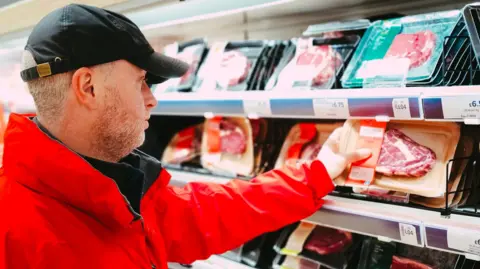The latest data on inflation in the United Kingdom reveals that it remains at a significant yet stable rate of 3.4% for the year ending in May. This figure is notably unchanged from April, a consistency that marks the highest inflation rate the UK has witnessed in over a year. The Office for National Statistics (ONS) informed the public that the stabilization in inflation arises due to several complex economic factors, notably the contrasting trends in airfares and food prices.
In detail, it was noted that a decrease in airplane ticket prices during the reporting period, particularly when compared to a sharp rise the previous year, contributed to this stability. The timing of Easter and school holidays likely affected the pricing strategies of airlines, leading to lower costs for travel. While airfares decreased, food prices have seen significant upward pressure, particularly on essential goods such as chocolate and meat, which experienced marked increases.
Interestingly, ONS’s report highlighted an increase in food prices for three consecutive months leading up to May, resulting in a 4.4% rise in food costs—the highest increase since February of the previous year. This surge in food prices may reflect underlying changes in the economic conditions affecting manufacturers and retailers. Ruth Gregory, the deputy chief economist at Capital Economics, noted that these increases in prices could indicate that companies are starting to pass on higher national insurance costs to consumers, stemming from previous tax adjustments implemented by the government.
As inflation remains notably elevated above the Bank of England’s target rate of 2%, the central bank’s response to this ongoing inflationary pressure has become a focal point as it prepares for its next meeting. Speculation suggests that it may choose not to adjust interest rates at this time, notwithstanding the pressing inflationary backdrop.
The comments from political leaders have also illustrated the broader implications of ongoing inflation on the populace. Chancellor Rachel Reeves indicated that the government is taking proactive steps to revitalize the economy with the intention of improving the living standards for working individuals. On the contrary, Shadow Chancellor Mel Stride expressed alarm at the inflation figures, labeling them as “deeply worrying for families.” Stride attributed this inflationary environment to what he described as excessive taxation and rising borrowing levels implemented by Labour, asserting such measures have impeded growth and escalated the expense of day-to-day essentials.
Additionally, some particularly surprising elements within the inflation report pertain to specific consumer goods. The increase in chocolate prices reached a pace not seen for nearly a decade. This has attracted attention as consumers grapple with the broader context of rising costs of living, impacting their spending habits and economic outlook.
Graphic data from recent reports show a detailed trend of inflation rates over time, presenting a stark narrative of economic fluctuations from January 2020 through May 2025. Notably, inflation surged to as high as 11.1% in October 2022 before gradually declining, illustrating the volatility and perturbations faced by the UK economy amidst global economic pressures.
As the economic landscape continues to evolve, analysts, consumer groups, and political leaders will remain vigilant, weighing not only the current state of inflation but also its implications for future policy decisions and societal impacts. The evolving narrative surrounding inflation is a critical component of economic discourse in the UK, intertwining themes of policy effectiveness, consumer behavior, and economic stability.



